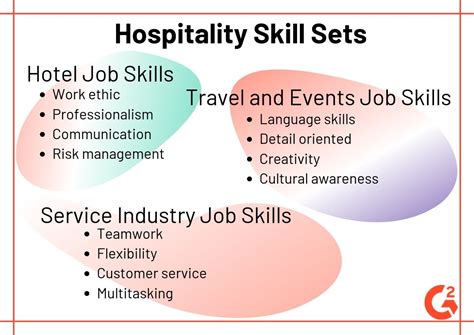The hospitality industry offers a diverse range of career opportunities for individuals with a hospitality degree. According to the U.S. Bureau of Labor Statistics (BLS), the industry is projected to grow by 10% from 2020 to 2030, adding approximately 1.8 million new jobs.

Common Jobs for Hospitality Graduates
- Hotel Manager: Oversees the operation of a hotel, including guest services, housekeeping, maintenance, and food and beverage.
- Restaurant Manager: Manages the overall operation of a restaurant, including menu planning, staffing, and customer service.
- Convention Services Manager: Plans and coordinates meetings, events, and conferences held at a hotel or convention center.
- Event Planner: Organizes and executes social and corporate events, including weddings, parties, and conferences.
- Cruise Director: Manages the activities and entertainment on a cruise ship.
- Food and Beverage Director: Oversees the food and beverage operations of a hotel, restaurant, or catering company.
- Front Desk Clerk: Provides assistance to guests checking in and out of a hotel.
- Concierge: Assists guests with travel arrangements, reservations, and other queries.
- Tour Operator: Plans and conducts guided tours for individuals or groups.
- Catering Manager: Manages the preparation and delivery of food for events and functions.
Higher-Level Management Positions
With experience and additional education, hospitality graduates can advance to higher-level management positions, such as:
- Director of Hospitality: Oversees all aspects of a hotel or resort’s operations, including marketing, finance, and human resources.
- General Manager: Manages the overall operation of a business, such as a hotel, restaurant, or casino.
- Corporate Executive: Holds a high-level position in a hospitality corporation, such as CEO or CFO.
Additional Career Options with a Hospitality Degree
In addition to traditional hospitality roles, graduates can also pursue careers in related fields, such as:
- Marketing and Sales: Plan and execute marketing campaigns for hotels, restaurants, and resorts.
- Public Relations: Manage the media relations and public image of hospitality businesses.
- Finance: Analyze financial data and manage the finances of hospitality businesses.
- Human Resources: Recruit, hire, and train employees for hospitality businesses.
- Hospitality Technology: Develop and implement technology solutions for hospitality businesses.
Benefits of a Hospitality Degree
- High earning potential: Hospitality managers earn a median annual salary of $96,830, according to the BLS.
- Growth opportunities: The hospitality industry is projected to grow rapidly in the coming years, creating ample opportunities for career advancement.
- Job security: Hospitality businesses are essential to society and are therefore less susceptible to economic downturns.
- International opportunities: Hospitality professionals can work in countries around the world.
- Networking opportunities: Hospitality students and graduates have opportunities to build a network of industry professionals.
Common Mistakes to Avoid
- Not getting hands-on experience: Employers value applicants with practical experience in the hospitality industry. Consider internships, part-time jobs, or volunteering in the field.
- Lacking communication skills: Excellent communication skills are essential in hospitality. Practice communicating effectively with colleagues, guests, and vendors.
- Not being adaptable: The hospitality industry is constantly evolving. Graduates need to be adaptable and open to change.
- Focusing only on large companies: Small and medium-sized hospitality businesses often offer great opportunities for growth and career development.
- Not pursuing professional development: Continuously improving skills and knowledge through workshops, conferences, and certifications can enhance career prospects.
How to Get Started
- Earn a hospitality degree: A bachelor’s or master’s degree in hospitality management is the foundation for a successful career in the industry.
- Gain hands-on experience: Participate in internships, work part-time in a hospitality setting, or volunteer at a local hotel or restaurant.
- Develop your skills: Focus on developing strong communication, problem-solving, and interpersonal skills.
- Network with industry professionals: Attend industry events, connect with professionals on LinkedIn, and join professional associations.
- Be adaptable and open to growth: The hospitality industry is constantly changing. Embrace new technologies and ideas and be willing to take on new challenges.
The Future of Hospitality
The hospitality industry is undergoing a period of rapid transformation, driven by technological advancements, changing consumer expectations, and the rise of globalization. To succeed in the future hospitality workforce, graduates need to embrace new technologies, develop intercultural skills, and understand the principles of sustainability.
Tables
| Position | Median Annual Salary |
|---|---|
| Hotel Manager | $92,850 |
| Restaurant Manager | $80,500 |
| Event Planner | $62,610 |
| Hospitality Director | $109,560 |
| Highest-Paying Hospitality Jobs | Median Annual Salary |
|---|---|
| Hotel General Manager | $156,460 |
| Corporate Executive | $198,430 |
| Vice President of Hospitality | $183,970 |
| States with the Most Hospitality Jobs | Number of Jobs |
|---|---|
| California | 1,558,150 |
| Florida | 1,276,720 |
| Texas | 1,108,590 |
| Hospitality Industry Growth Projections | Projected Growth |
|---|---|
| Food and beverage establishments | 7% |
| Hotels and motels | 6% |
| Travel and tourism | 4% |
